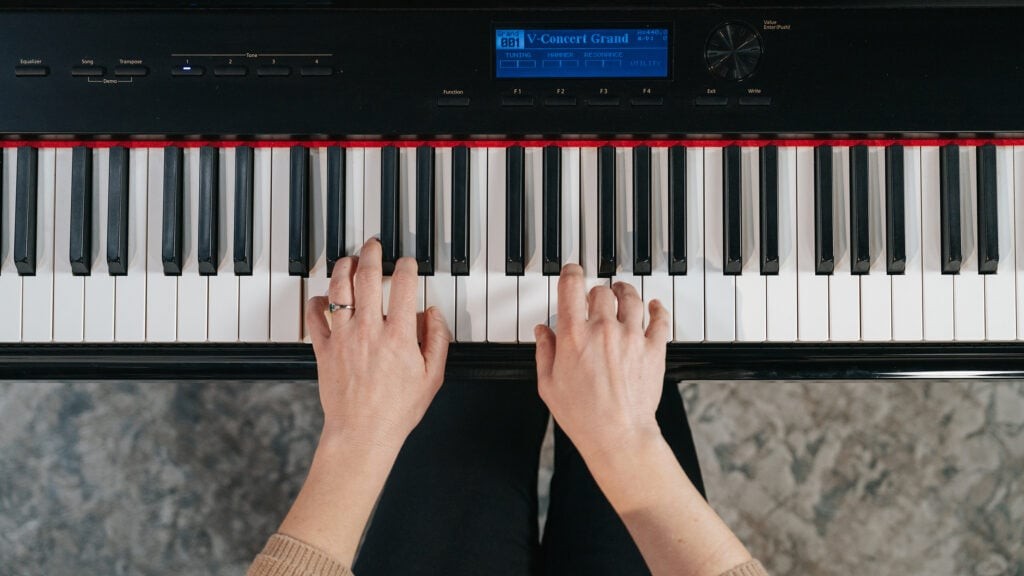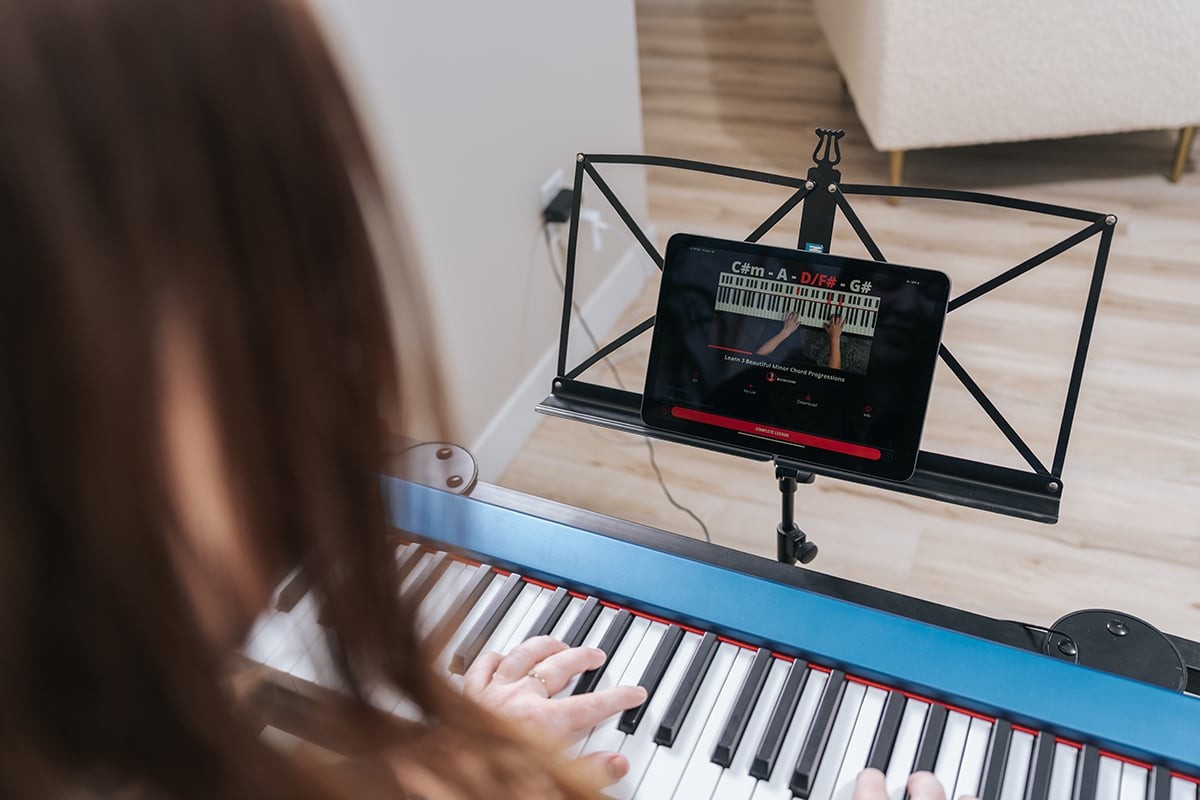Learning to play the piano presents a rewarding journey, and at LEARNS.EDU.VN, we believe everyone can embark on this musical adventure with the right guidance and resources. While it’s true that mastering the piano demands dedication and perseverance, understanding the challenges and adopting effective strategies can transform the experience into an enjoyable and achievable endeavor. Let’s explore the nuances of piano learning, covering everything from initial challenges to advanced techniques, practice methods, and the significance of music theory, ensuring you’re well-equipped to succeed.
1. Understanding the Piano Learning Curve
Is learning piano difficult? Yes, but it is manageable. Many perceive learning the piano as an arduous task, yet the level of difficulty is subjective and varies depending on several elements. Your musical background, commitment level, and goals all play significant roles. Let’s break down the typical learning curve:
- Beginner Stage: This initial phase focuses on familiarizing yourself with the keyboard, understanding basic music notation, and developing hand coordination. It is often the most exciting stage as you witness quick progress.
- Intermediate Stage: As you advance, you encounter more complex rhythms, harmonies, and musical pieces. This stage requires patience and disciplined practice to overcome challenges like playing with both hands independently.
- Advanced Stage: Reaching an advanced level involves mastering intricate techniques, performing complex pieces, and developing your unique musical expression. This stage requires continuous learning and refinement.
2. Key Challenges in Learning Piano
While the piano is accessible for beginners, certain challenges can seem daunting. Recognizing these challenges early allows you to tackle them effectively.
2.1. Hand Independence
Playing different rhythms and melodies with each hand simultaneously is one of the first major hurdles. This requires developing neural pathways that allow each hand to operate independently.
- Challenge: Difficulty coordinating different actions between the left and right hands.
- Solution: Start with simple exercises, such as playing scales or chords with one hand while maintaining a steady rhythm with the other. Gradually increase the complexity as coordination improves.
2.2. Reading Music
Decoding musical notation might seem like learning a new language. Pianists must learn to read both treble and bass clefs simultaneously, which can be initially overwhelming.
- Challenge: Difficulty interpreting the symbols and notations on sheet music.
- Solution: Use online resources and apps to practice sight-reading. Start with simple melodies and gradually progress to more complex arrangements. Understanding music theory can also enhance your ability to read music fluently.
2.3. Music Theory
A solid understanding of music theory is crucial for comprehending the structure and harmony of music. It helps you analyze and interpret pieces more effectively.
- Challenge: Grasping the theoretical concepts behind chords, scales, and harmonies.
- Solution: Enroll in a music theory course or use online resources to study basic concepts. Practice applying theoretical knowledge to your playing to deepen your understanding.
2.4. Practice and Time Commitment
Consistent and focused practice is essential for progress. Balancing practice with other commitments can be challenging, requiring discipline and time management.
- Challenge: Finding the time and motivation to practice regularly.
- Solution: Create a structured practice schedule and stick to it. Set realistic goals and celebrate small achievements to stay motivated. Short, focused practice sessions can be more effective than long, infrequent ones.
2.5. Physical Demands
Playing the piano involves intricate hand and finger movements, which can cause strain if not done correctly. Proper technique and posture are vital to avoid injuries.
- Challenge: Physical discomfort or pain due to incorrect posture or technique.
- Solution: Work with a qualified piano teacher who can provide guidance on proper technique. Ensure your posture is correct and take frequent breaks to stretch and relax your hands.
3. Factors Influencing Learning Difficulty
Several factors can affect how easy or hard you find learning to play the piano. Understanding these can help you optimize your learning approach.
3.1. Age
While it’s a myth that older adults can’t learn the piano, age can influence learning speed and approach.
- Children: Often learn faster due to higher neuroplasticity. They may benefit from playful and interactive teaching methods.
- Adults: May progress slower but possess the discipline and analytical skills to understand complex concepts. Tailored learning plans that align with personal goals are effective.
3.2. Prior Musical Experience
Having prior experience with another instrument can make learning the piano easier due to pre-existing musical knowledge.
- Advantage: Understanding of rhythm, melody, and harmony.
- Challenge: Overcoming habits specific to the previous instrument that don’t apply to the piano.
3.3. Learning Style
Everyone has a unique learning style, and finding the right teaching method is crucial.
- Visual Learners: Benefit from watching demonstrations and using visual aids.
- Auditory Learners: Learn best by listening to music and verbal explanations.
- Kinesthetic Learners: Prefer hands-on practice and learning through movement.
3.4. Quality of Instruction
The guidance of a skilled teacher can significantly impact your learning journey.
- Benefits: Personalized feedback, technique correction, and structured learning plans.
- Considerations: Look for teachers with experience, positive reviews, and a teaching style that aligns with your learning preferences. At LEARNS.EDU.VN, we can connect you with a host of qualified educators to support your journey.
3.5. Instrument Quality
The quality of your piano or keyboard can affect your playing experience.
- Weighted Keys: Essential for developing proper finger strength and technique.
- Full-Size Keyboard: Allows you to play a wide range of music without limitations.
- Digital vs. Acoustic: Digital pianos offer advantages like volume control and portability, while acoustic pianos provide a richer, more authentic sound.
4. Strategies to Simplify Piano Learning
Although learning the piano presents challenges, adopting the right strategies can make the process smoother and more enjoyable.
4.1. Set Realistic Goals
- Beginner Goals: Learn basic chords, play simple melodies, and understand music notation.
- Intermediate Goals: Play more complex pieces, improve sight-reading skills, and explore different genres.
- Advanced Goals: Master advanced techniques, perform challenging repertoire, and develop your unique style.
4.2. Break Down Complex Tasks
Divide complex pieces into smaller, manageable sections.
- Example: Focus on mastering one hand at a time before combining both.
- Benefit: Prevents feeling overwhelmed and allows you to focus on specific areas.
4.3. Practice Regularly
Consistency is key. Aim for short, focused practice sessions rather than long, infrequent ones.
- Recommended Schedule: 30 minutes to 1 hour daily.
- Tip: Schedule practice at a time when you’re most alert and focused.
4.4. Use Technology
Leverage apps, online resources, and software to enhance your learning.
- Apps: Note recognition, rhythm training, and sight-reading practice.
- Online Resources: Tutorials, sheet music, and interactive lessons.
- Software: MIDI keyboards and recording software for composition and practice.
4.5. Find a Supportive Community
Connect with other piano learners to share experiences and stay motivated.
- Online Forums: Participate in discussions and seek advice.
- Local Groups: Join piano clubs or attend recitals for inspiration and support.
- Seek out LEARNS.EDU.VN to connect with other like-minded individuals.
4.6. Choose Music You Enjoy
Learning becomes more enjoyable when you play music you love.
- Personalized Repertoire: Select pieces that resonate with your musical taste.
- Motivation: Enjoying the music keeps you engaged and motivated to practice.
- Versatility: Explore various genres to broaden your musical horizons.
5. The Role of Music Theory in Piano Learning
Understanding music theory enhances your ability to learn and play the piano effectively.
5.1. Basics of Music Theory
- Notes and Scales: Learn the names of notes, how scales are constructed, and their role in melodies and harmonies.
- Chords: Understand how chords are formed, their functions within a key, and how to play different types of chords.
- Rhythm: Master basic rhythmic patterns, time signatures, and how to count rhythms accurately.
5.2. Benefits of Music Theory
- Improved Sight-Reading: Understanding key signatures and harmonic progressions helps you anticipate notes and rhythms.
- Enhanced Memorization: Theoretical knowledge aids in understanding the structure of a piece, making it easier to memorize.
- Creative Expression: Knowing how chords and scales work allows you to improvise and compose your own music.
5.3. Resources for Learning Music Theory
- Online Courses: Websites like Coursera and Udemy offer comprehensive music theory courses.
- Books: “Music Theory for Dummies” and “The Complete Idiot’s Guide to Music Theory” are excellent resources for beginners.
- Apps: Teoria and Functional Ear Trainer are useful for ear training and theory practice.
6. Choosing the Right Learning Resources
Selecting the right resources can significantly impact your piano learning journey.
6.1. Piano Teachers
- Benefits: Personalized instruction, technique correction, and customized learning plans.
- Considerations: Look for teachers with experience, positive reviews, and a teaching style that aligns with your learning preferences.
6.2. Online Piano Lessons
- Benefits: Flexibility, affordability, and a wide range of courses.
- Platforms: LEARNS.EDU.VN, Flowkey, and Skoove offer structured lessons and interactive feedback.
6.3. Piano Learning Apps
- Benefits: Gamified lessons, progress tracking, and convenient practice tools.
- Popular Apps: Simply Piano, Piano Marvel, and Yousician.
6.4. Sheet Music and Songbooks
- Benefits: Access to a vast repertoire of music for practice and performance.
- Resources: Musicnotes.com and Hal Leonard offer a wide selection of sheet music and songbooks.
6.5. YouTube Channels and Tutorials
- Benefits: Free access to lessons, tutorials, and performances.
- Channels: Pianote, Hoffman Academy, and Lypur provide valuable content for piano learners.
7. Practicing Effectively: Tips and Techniques
Effective practice is crucial for making progress and achieving your piano goals.
7.1. Warm-Up Exercises
- Scales and Arpeggios: Develop finger dexterity and technique.
- Stretches: Prevent injuries and improve flexibility.
7.2. Focused Practice Sessions
- Targeted Goals: Focus on specific skills or sections of a piece.
- Active Listening: Pay attention to your playing and identify areas for improvement.
7.3. Slow Practice
- Benefits: Allows you to focus on accuracy, rhythm, and technique.
- Metronome: Use a metronome to maintain a steady tempo.
7.4. Repetition
- Deliberate Practice: Repeat difficult passages until they become natural.
- Spaced Repetition: Review previously learned material to reinforce knowledge.
7.5. Mental Practice
- Visualization: Imagine yourself playing the piano to reinforce neural pathways.
- Score Study: Analyze the score away from the piano to deepen your understanding.
8. Overcoming Common Challenges
Learning the piano can be challenging. Here are some common hurdles and how to overcome them.
8.1. Lack of Motivation
- Solution: Set achievable goals, find a practice buddy, and reward yourself for progress.
- Tip: Revisit your reasons for learning the piano to reignite your passion.
8.2. Plateaus
- Solution: Try new exercises, learn a different genre, or seek feedback from a teacher.
- Tip: Embrace challenges as opportunities for growth.
8.3. Time Constraints
- Solution: Schedule short, focused practice sessions and integrate piano learning into your daily routine.
- Tip: Use waiting times or commutes to listen to music and study scores.
8.4. Performance Anxiety
- Solution: Practice performing in front of friends or family, and focus on enjoying the music.
- Tip: Prepare thoroughly and visualize a successful performance.
8.5. Physical Strain
- Solution: Use proper posture, take frequent breaks, and stretch your hands and wrists.
- Tip: Consult a physical therapist or piano teacher for guidance on technique.
9. Staying Motivated and Enjoying the Process
The journey of learning the piano is a marathon, not a sprint. Here’s how to stay motivated and enjoy the process.
9.1. Celebrate Progress
- Acknowledge Achievements: Recognize and celebrate milestones, no matter how small.
- Reward System: Treat yourself after reaching a goal to stay motivated.
9.2. Variety in Practice
- Mix It Up: Alternate between scales, chords, pieces, and improvisation to keep practice interesting.
- Explore Genres: Try different styles of music to broaden your horizons and challenge yourself.
9.3. Connect with Other Musicians
- Shared Experiences: Exchange tips, ideas, and inspiration with fellow piano learners.
- Collaborative Projects: Play duets, join bands, or perform together to enhance your musical experience.
9.4. Attend Concerts and Performances
- Inspiration: Witnessing professional pianists can inspire and motivate you.
- Learning Opportunities: Observe techniques, musicality, and performance skills.
9.5. Remember Your “Why”
- Purpose: Stay connected to your initial reasons for learning the piano.
- Personal Connection: Use music to express emotions, connect with others, and enrich your life.
10. Advanced Techniques for Piano Mastery
For those aspiring to reach an advanced level, mastering these techniques is essential.
10.1. Advanced Scales and Arpeggios
- Variations: Practice scales and arpeggios in different keys, rhythms, and articulations.
- Inversions: Learn and practice inversions to improve finger dexterity and understanding of harmony.
10.2. Complex Rhythms
- Polyrhythms: Practice playing different rhythms simultaneously to develop coordination.
- Syncopation: Master syncopated rhythms to add groove and complexity to your playing.
10.3. Improvisation
- Chord Progressions: Improvise over various chord progressions to develop your musical creativity.
- Scales and Modes: Use scales and modes to create melodies and solos.
10.4. Sight-Reading
- Practice Regularly: Sight-read new music daily to improve your ability to read and perform on the spot.
- Challenging Repertoire: Choose pieces slightly above your current level to push your skills.
10.5. Performance Skills
- Stage Presence: Develop confidence and charisma to engage your audience.
- Interpretation: Convey the emotions and nuances of the music through your playing.
11. The Future of Piano Learning
Technology continues to transform how we learn the piano.
11.1. Virtual Reality (VR)
- Immersive Learning: VR offers immersive experiences that simulate real-world performance scenarios.
- Interactive Lessons: VR apps provide interactive lessons and feedback.
11.2. Artificial Intelligence (AI)
- Personalized Feedback: AI algorithms analyze your playing and provide customized feedback.
- Adaptive Learning: AI platforms adjust the difficulty level based on your progress.
11.3. Online Communities
- Global Connections: Online platforms connect piano learners worldwide.
- Collaborative Opportunities: Virtual ensembles and online recitals foster collaboration and performance opportunities.
Here’s a quick glance at the latest trends and information:
| Trend | Description | Benefits |
|---|---|---|
| VR Piano Learning | Immersive environments simulate performance scenarios, offering interactive lessons and feedback. | Enhanced engagement, realistic practice, and personalized learning experiences. |
| AI-Powered Feedback | Algorithms analyze playing, providing customized feedback on technique, rhythm, and expression. | Immediate correction, adaptive difficulty, and targeted improvement strategies. |
| Global Online Communities | Platforms connect piano learners worldwide, fostering collaboration and offering virtual performance opportunities. | Peer support, diverse perspectives, and opportunities for virtual collaboration and performance. |
| Gamified Learning Apps | Apps incorporate game-like elements to make learning fun and engaging, tracking progress and rewarding achievements. | Increased motivation, consistent practice, and enjoyable learning experiences. |
| Cloud-Based Sheet Music | Digital sheet music libraries accessible on any device, with interactive features like adjustable tempo and note highlighting. | Convenience, portability, and enhanced practice tools. |






12. Conclusion: Is Learning Piano Worth It?
Learning the piano presents challenges, but the rewards are immeasurable. From enhancing cognitive skills and emotional expression to providing a lifelong source of joy and fulfillment, the benefits of playing the piano are numerous. With the right approach, resources, and dedication, anyone can learn to play the piano and unlock a world of musical possibilities.
Embarking on the journey of learning piano is within your reach, and at LEARNS.EDU.VN, we’re committed to providing the resources and support you need to succeed.
Frequently Asked Questions (FAQ)
1. How long does it take to become proficient at playing the piano?
Proficiency varies, but typically, it takes 2-3 years of consistent practice to reach an intermediate level and 5-7 years to achieve advanced skills.
2. Is it harder to learn piano as an adult?
Adults may face challenges like less flexible schedules, but they also bring focus and discipline that can accelerate learning.
3. Can I teach myself to play the piano?
Yes, self-teaching is possible with online resources and apps, but a teacher can provide personalized guidance and correct technique issues.
4. How much should I practice each day?
Aim for 30 minutes to 1 hour of focused practice daily. Consistency is more important than duration.
5. What is the best age to start learning piano?
Many experts recommend starting around age 6 or 7, but it’s never too late to begin learning.
6. Do I need to learn music theory to play the piano?
While not essential initially, music theory greatly enhances your understanding and ability to play more complex pieces.
7. What type of piano or keyboard should I buy?
A digital piano with weighted keys is a good option for beginners due to its affordability and realistic feel.
8. How can I stay motivated to practice?
Set achievable goals, choose music you enjoy, and find a supportive community.
9. What should I do if I get stuck or frustrated?
Take a break, try a new exercise, or seek advice from a teacher or online forum.
10. Can I learn to play the piano if I don’t have a musical background?
Absolutely! Everyone starts somewhere, and with dedication and practice, you can learn to play the piano regardless of your background.
Ready to start your piano learning journey? Visit learns.edu.vn to explore a wealth of resources, connect with expert instructors, and find the tools you need to succeed. Our comprehensive courses and personalized support ensure that you have the best possible learning experience. Contact us today at 123 Education Way, Learnville, CA 90210, United States or reach out via Whatsapp at +1 555-555-1212. We’re here to help you every step of the way!